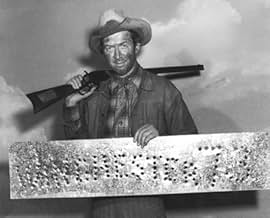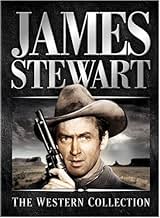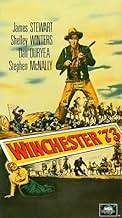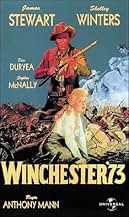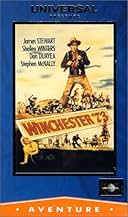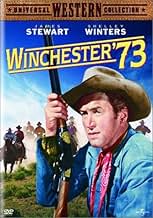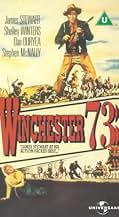AVALIAÇÃO DA IMDb
7,6/10
24 mil
SUA AVALIAÇÃO
A obsessão de um vaqueiro por um fuzil roubado o leva numa odisseia cheia de balas através do oeste americano.A obsessão de um vaqueiro por um fuzil roubado o leva numa odisseia cheia de balas através do oeste americano.A obsessão de um vaqueiro por um fuzil roubado o leva numa odisseia cheia de balas através do oeste americano.
- Direção
- Roteiristas
- Artistas
- Prêmios
- 1 vitória e 1 indicação no total
Tony Curtis
- Doan
- (as Anthony Curtis)
Victor Adamson
- Townsman
- (não creditado)
Robert Anderson
- Basset
- (não creditado)
- Direção
- Roteiristas
- Elenco e equipe completos
- Produção, bilheteria e muito mais no IMDbPro
Avaliações em destaque
Winchester '73 is one of the most enduring and popular films of James Stewart's career, for several reasons; it was the first of five teamings with brilliant, underrated director Anthony Mann, who retooled Stewart's drawling, 'aw-shucks' persona into a laconic, edgier, more flawed hero; it featured a brilliant cast, including Shelley Winters, Dan Duryea, Stephen McNally, John McIntyre, and, in VERY early appearances, Rock Hudson and Tony Curtis; visually, it is spectacular, one of the most beautiful Black and White films ever made, with deep-focus photography highlighting rugged Arizona settings that literally leap from the screen; and, most of all, it is a terrific variation of 'Cain and Abel', told through the premise of the search for a 'one-of-a-kind' rifle Stewart wins in a competition, then loses through treachery. It's the kind of film that offers new insights each time you view it, as the actions and motivations of 'good' brother Stewart and 'bad' brother McNally become better understood.
What truly makes this DVD an 'essential', though, is the bonus track...Described as an 'interview' with Stewart, it is actually an audio commentary that runs through the film, offering not only his reflections about the making of Winchester '73, but insights about his career, working with John Ford, Alfred Hitchcock, and his great friends Henry Fonda and John Wayne, even a nice story about his long-time mount, Pie. Recorded several years ago for the laserdisc edition of Winchester '73, it provides a rare opportunity to hear a screen legend reminisce (and makes you wish Wayne and Fonda had lived long enough to have offered personal observations about THEIR classic films!)
This is a DVD NOT to be missed!
What truly makes this DVD an 'essential', though, is the bonus track...Described as an 'interview' with Stewart, it is actually an audio commentary that runs through the film, offering not only his reflections about the making of Winchester '73, but insights about his career, working with John Ford, Alfred Hitchcock, and his great friends Henry Fonda and John Wayne, even a nice story about his long-time mount, Pie. Recorded several years ago for the laserdisc edition of Winchester '73, it provides a rare opportunity to hear a screen legend reminisce (and makes you wish Wayne and Fonda had lived long enough to have offered personal observations about THEIR classic films!)
This is a DVD NOT to be missed!
Buffs of the adult western that flourished in the 1950s try and trace its origins to the film that kicked off the syndrome. Of course, we can go back to Howard Hawks's Red River (1948) or further still to John Ford's My Darling Clementine (1946), but if we want to stick with this single decade, then it has to be one of a couple of films made in that era's initial year. One is "The Gunfighter," an exquisitely grim tale of a famed gunslinger (Ringo) facing his last shootout. Another from that same year is "Winchester '73," and it's worth noting that Millard Mitchell appears in both as grim, mustached, highly realistic range riders. In The Gunfighter, he's the town marshal expected to arrest Ringo but once rode with him in an outlaw gang. In Winchester, he's the sidekick to Jimmy Stewart, a kind of Horatio to Stewart's Hamlet in this epic/tragic tale. The plot is simple enough: Stewart's lonesome cowpoke wins a remarkable Winchester in a shooting match, beating the meanest man in the west (Stephen McNally), who is actually his own brother and caused the death of their father. When the brother steals the gun, Stewart and Mitchell go after him in a cowboy odyssey that takes them all across the frontier, meeting up with both outlaws and Indians. (In one wonderful bit, two future stars - Rock Hudson and Tony Curtis - play an Indian chief and a U.S. cavalry soldier - during a well staged pitched-battle. Dan Duryea steals the whole show as a giggling outlaw leader, while Shelly Winters, just before she began to gain weight, is fine as the shady lady who ties all the plots together. Today, filmmakers would go on for about four hours to bring such an ambitious idea to the screen, but Anthony Mann does so in an extremely economical amount of time, with not a minute wasted. Such western legends as Bat Masterson and Wyatt Earp (terrifically played by Will Geer) make brief appearances, adding to the historicity as well as the epic nature. The final battle between good and bad brothers, high atop a series of jutting rock canyons, is now legendary among western buffs. It's also worth noting that Stewart, however much associated he became with western films, does what is actually his first western leading man role here - yes, he was in Destry Rides Again eleven years earlier, but was cast in that comedy spoof because he seemed so WRONG for westerns!
For the viewer who comes upon it long after its making, "Winchester '73" has something in common with "Casablanca." While you watch it, you get this feeling that you're looking at a string of clichés encountered so often in the genre; then you realise that the clichés became clichés only after being copied from this particular film, and that they were so widely copied because this film was so great. In other words, it's a seminal work.
"Winchester '73" is a joy to watch. The broad lines of the plot are somewhat predictable, but mostly because you've seen them copied so many times in later movies, and nevertheless it still contains a number of twists which surprise you. The dialogue, the pacing and Mann's direction are excellent. Stewart shines in particular, and if you're a fan this is a "must-see," but he is not alone in delivering a good performance. Remarkably, many of the most thoughtful and/or witty lines go to minor characters. Because this makes these characters (much) more than cardboard cutouts, it lent additional realism to the film.
This is a remarkably underrated film, and well worth keeping an eye out for. The DVD also contains an interview with Stewart which provides some background on the film.
"Winchester '73" is a joy to watch. The broad lines of the plot are somewhat predictable, but mostly because you've seen them copied so many times in later movies, and nevertheless it still contains a number of twists which surprise you. The dialogue, the pacing and Mann's direction are excellent. Stewart shines in particular, and if you're a fan this is a "must-see," but he is not alone in delivering a good performance. Remarkably, many of the most thoughtful and/or witty lines go to minor characters. Because this makes these characters (much) more than cardboard cutouts, it lent additional realism to the film.
This is a remarkably underrated film, and well worth keeping an eye out for. The DVD also contains an interview with Stewart which provides some background on the film.
My favorite movie genre is the western, it's really the only movie genre that is of American origin. And despite Sergio Leone, no one does them quite like Americans.
Right at the top of my list of ten favorites westerns is Winchester 73. It was the first pairing and only black and white film of the partnership of director Anthony Mann and actor James Stewart. It was also a landmark film in which Stewart opted for a percentage of the profits instead of a straight salary from Universal. Many such deals followed for players, making them as rich as the moguls who employed them.
Anthony Mann up to this point had done mostly B pictures, noir type stuff with no real budgets. Just before Winchester 73 Mann had done a fine western with Robert Taylor, Devil's Doorway, that never gets enough praise. I'm sure James Stewart must have seen it and decided Mann was the person he decided to partner with.
In this film Mann also developed a mini stock company the way John Ford was legendary for. Besides Stewart others in the cast like Millard Mitchell, Steve Brodie, Dan Duryea, John McIntire, Jay C. Flippen and Rock Hudson would appear in future Mann films.
It's a simple plot, James Stewart is obsessed with finding a man named Dutch Henry Brown and killing him. Why I won't say, but up to this point we had never seen such cold fury out of James Stewart on screen. Anthony Mann reached into Jimmy Stewart's soul and dragged out some demons all of us are afraid we have.
The hate is aptly demonstrated in a great moment towards the beginning of the film. After Stewart and sidekick Millard Mitchell are disarmed by Wyatt Earp played by Will Geer because guns aren't carried in Earp's Dodge City. There's a shooting contest for a Winchester rifle in Dodge City and the betting favorite is Dutch Henry Brown, played with menace by Stephen McNally. Stewart, Mitchell and Geer go into the saloon and Stewart and McNally spot each other at the same instant and reach to draw for weapons that aren't there. Look at the closeups of Stewart and McNally, they say more than 10 pages of dialog.
Another character Stewart runs into in the film is Waco Johnny Dean played by Dan Duryea who almost steals the film. This may have been Duryea's finest moment on screen. He's a psychopathic outlaw killer who's deadly as a left handed draw even though he sports two six guns.
Another person Stewart meets is Shelley Winters who's fiancé is goaded into a showdown by Duryea and killed. Her best scenes are with Duryea who's taken a fancy to her. She plays for time until she can safely get away from him. Guess who she ultimately winds up with?
There are some wonderful performances in some small roles, there ain't a sour note in the cast. John McIntire as a shifty Indian trader, Jay C. Flippen as the grizzled army sergeant and Rock Hudson got his first real notice as a young Indian chief. Even John Alexander, best known as 'Theodore Roosevelt' in Arsenic and Old Lace has a brief, but impressive role as the owner of a trading post where both McNally and Stewart stop at different times.
Mann and Stewart did eight films together, five of them westerns, and were ready to do a sixth western, Night Passage when they quarreled and Mann walked off the set. The end of a beautiful partnership that produced some quality films.
Right at the top of my list of ten favorites westerns is Winchester 73. It was the first pairing and only black and white film of the partnership of director Anthony Mann and actor James Stewart. It was also a landmark film in which Stewart opted for a percentage of the profits instead of a straight salary from Universal. Many such deals followed for players, making them as rich as the moguls who employed them.
Anthony Mann up to this point had done mostly B pictures, noir type stuff with no real budgets. Just before Winchester 73 Mann had done a fine western with Robert Taylor, Devil's Doorway, that never gets enough praise. I'm sure James Stewart must have seen it and decided Mann was the person he decided to partner with.
In this film Mann also developed a mini stock company the way John Ford was legendary for. Besides Stewart others in the cast like Millard Mitchell, Steve Brodie, Dan Duryea, John McIntire, Jay C. Flippen and Rock Hudson would appear in future Mann films.
It's a simple plot, James Stewart is obsessed with finding a man named Dutch Henry Brown and killing him. Why I won't say, but up to this point we had never seen such cold fury out of James Stewart on screen. Anthony Mann reached into Jimmy Stewart's soul and dragged out some demons all of us are afraid we have.
The hate is aptly demonstrated in a great moment towards the beginning of the film. After Stewart and sidekick Millard Mitchell are disarmed by Wyatt Earp played by Will Geer because guns aren't carried in Earp's Dodge City. There's a shooting contest for a Winchester rifle in Dodge City and the betting favorite is Dutch Henry Brown, played with menace by Stephen McNally. Stewart, Mitchell and Geer go into the saloon and Stewart and McNally spot each other at the same instant and reach to draw for weapons that aren't there. Look at the closeups of Stewart and McNally, they say more than 10 pages of dialog.
Another character Stewart runs into in the film is Waco Johnny Dean played by Dan Duryea who almost steals the film. This may have been Duryea's finest moment on screen. He's a psychopathic outlaw killer who's deadly as a left handed draw even though he sports two six guns.
Another person Stewart meets is Shelley Winters who's fiancé is goaded into a showdown by Duryea and killed. Her best scenes are with Duryea who's taken a fancy to her. She plays for time until she can safely get away from him. Guess who she ultimately winds up with?
There are some wonderful performances in some small roles, there ain't a sour note in the cast. John McIntire as a shifty Indian trader, Jay C. Flippen as the grizzled army sergeant and Rock Hudson got his first real notice as a young Indian chief. Even John Alexander, best known as 'Theodore Roosevelt' in Arsenic and Old Lace has a brief, but impressive role as the owner of a trading post where both McNally and Stewart stop at different times.
Mann and Stewart did eight films together, five of them westerns, and were ready to do a sixth western, Night Passage when they quarreled and Mann walked off the set. The end of a beautiful partnership that produced some quality films.
The prize rifle of a drifter (James Stewart) is stolen by his nemesis (Stephen McNally), apprehended by a gun-trader (John McIntire), involved in a cavalry vs. Indian clash, winds up in the hands of a man who struggles with cowardice (Charles Drake) before being swiped by a charismatic outlaw (Dan Duryea). Meanwhile Lin McAdam (Stewart) pursues it with his faithful pardner (Millard Mitchell).
While "Winchester '73" (1950) was shot in flat B&W, it's a compelling action-packed Western with noir touches highlighted by the notable cast, which also includes Will Geer and Shelly Winters (when she was young, fit and voluptuous, not to mention spunky). Also look for Rock Hudson as the lead brave Young Bull and Tony Curtis as a besieged cavalry trooper.
The movie throws in Dodge City, Kansas, and a surprisingly congenial, almost bumbling (and too-old) Wyatt Earp (Geer) even though it's clear that the film was shot in southern Arizona. For instance, the saguaro cactus is native to the Sonoran Desert and not within 800 miles of Dodge City. But Tascosa, Texas, works okay within the framework of the Southwest, I guess. Basically, you have to ignore some misleading geography and a dubious Wyatt Earp to enjoy the picture.
The film runs 1 hour, 32 minutes, and was shot mainly in southern Arizona with studio stuff done at Universal Studios, California, with some exterior shots of Zion National Park, Utah.
GRADE: B.
While "Winchester '73" (1950) was shot in flat B&W, it's a compelling action-packed Western with noir touches highlighted by the notable cast, which also includes Will Geer and Shelly Winters (when she was young, fit and voluptuous, not to mention spunky). Also look for Rock Hudson as the lead brave Young Bull and Tony Curtis as a besieged cavalry trooper.
The movie throws in Dodge City, Kansas, and a surprisingly congenial, almost bumbling (and too-old) Wyatt Earp (Geer) even though it's clear that the film was shot in southern Arizona. For instance, the saguaro cactus is native to the Sonoran Desert and not within 800 miles of Dodge City. But Tascosa, Texas, works okay within the framework of the Southwest, I guess. Basically, you have to ignore some misleading geography and a dubious Wyatt Earp to enjoy the picture.
The film runs 1 hour, 32 minutes, and was shot mainly in southern Arizona with studio stuff done at Universal Studios, California, with some exterior shots of Zion National Park, Utah.
GRADE: B.
Você sabia?
- CuriosidadesJames Stewart credited this film with saving and redefining his career after a series of postwar flops threatened to seriously damage it.
- Erros de gravaçãoThis movie is based on a rifle-shooting competition held in Dodge City on 4 July 1876. During a poker game in the movie, Dutch refers to a "Dead Man's Hand". This refers to the poker hand 'Wild Bill' Hickok was holding when he was shot in the back by Jack McCall on 2 August 1876 - less than a month later. It was too soon for the "Dead Man's Hand" to be a famous phrase. However, per IMDb guidelines for Anachronisms, "a good deal of leeway" is allowed; linguistic anachronisms are usually excused (modern words in historical films) - "always bear in mind that it's entertainment not documentary."
- Citações
Wyatt Earp: That's Dutch Henry Brown. I thought you said you didn't know him.
Lin McAdam: I said I didn't recall the name.
- Cenas durante ou pós-créditosThe film's opening prologue states: This is a story of the Winchester Rifle Model 1873 "The gun that won the West" To cowman, outlaw, peace officer or soldier, the Winchester '73 was a treasured possession. An Indian would sell his soul to own one . . .
- ConexõesFeatured in MacArthur, O General Rebelde (1977)
Principais escolhas
Faça login para avaliar e ver a lista de recomendações personalizadas
- How long is Winchester '73?Fornecido pela Alexa
Detalhes
- Data de lançamento
- País de origem
- Central de atendimento oficial
- Idioma
- Também conhecido como
- Winchester 73
- Locações de filme
- Empresa de produção
- Consulte mais créditos da empresa na IMDbPro
Bilheteria
- Faturamento bruto mundial
- US$ 3.172
- Tempo de duração
- 1 h 32 min(92 min)
- Cor
- Proporção
- 1.37 : 1
Contribua para esta página
Sugerir uma alteração ou adicionar conteúdo ausente

